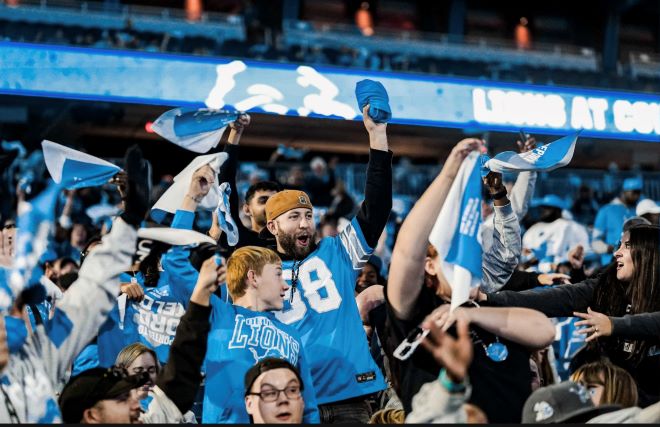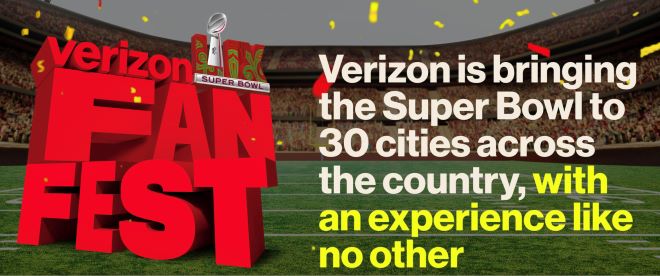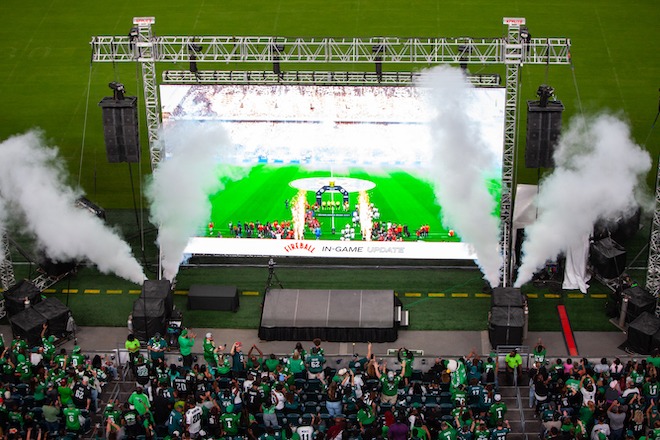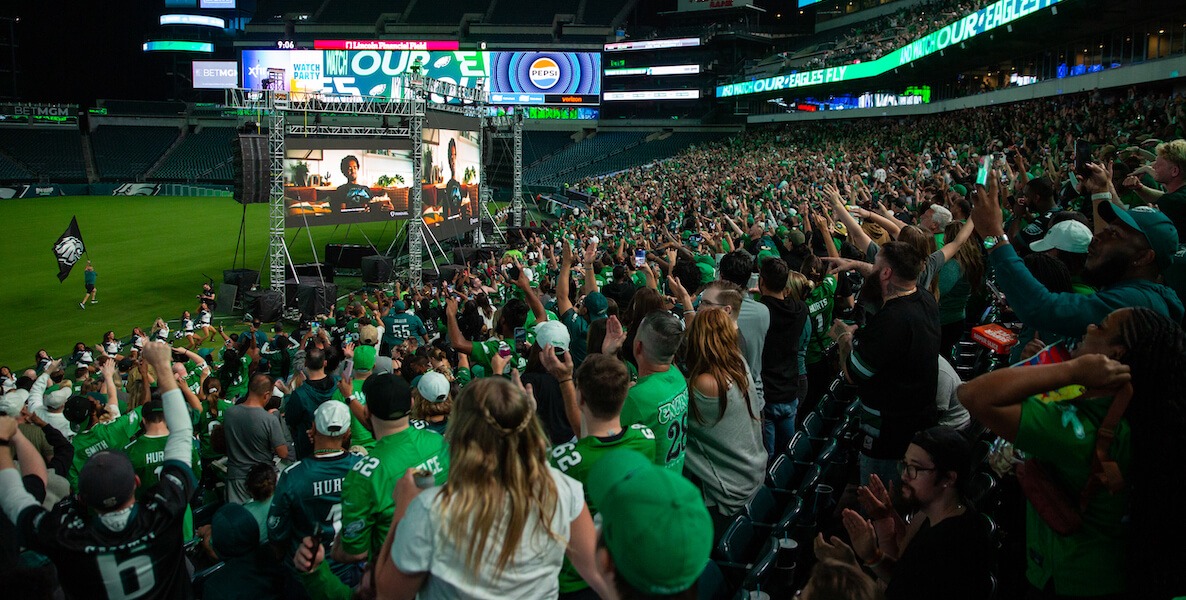Back in 2018, I was at a Super Bowl house party in South Philly when the Eagles won the big game against the New England Patriots.
Within seconds of quarterback Tom Brady’s failed Hail Mary, which cemented the Birds’ 41-33 win, we exploded onto Broad Street with other screaming fans, running downtown like the bulls in Pamplona to celebrate.
We had no plan, no end goal, no umbrellas that rainy evening. We didn’t care.
The Birds had won their first ever Super Bowl and — chef’s kiss! — humiliated pompous Brady in the process. All we wanted was to experience the euphoria with as many fans as Broad Street could contain. The closer we got to City Hall, the thicker the loud crowd grew, until moving forward became a crushing game of inches.
I started a #FreeTheSuperBowl petition on change.org asking NFL Commissioner Roger Goodell and friends to change their minds. Over 5,500 people signed it, but an in-stadium Super Bowl watch party never materialized.
At one point, my face smashed into the back of a stranger, while a guy behind me shouted, “Sorry, hon!” as his big chest pushed me forward.
“It’s okay!” I screamed, my words muffled by the wet jacket in front of me. “GO, BIRDS!”
Clearly, we were going to die. But what a way to go!
As perfect as that night was, it hadn’t unfolded where I’d hoped it would — inside Lincoln Financial Field, where I’d desperately wanted the Eagles to host a Super Bowl viewing party so fans could watch the game together.
I was a Daily News metro columnist at the time, and I’d been on a mission to convince the NFL to open the stadiums of competing Super Bowl teams — in this case, both the Linc and Gillette Stadium, the Patriots home base — for public watch parties. As I wrote:
How much crazy fun would it be to watch the Super Bowl on the Linc’s fantastic 27-by-96-foot, Panasonic LED video screens with 69,175 other fans – jacked on hope and Schmitters — roaring loud enough to rattle molars in Delco?
But the NFL prohibited such gatherings, said the NFL spokesman I pitched on the idea. He explained that the league, which owns the broadcast rights to all NFL games, had a long-standing policy of forbidding “the mass, out-of-home viewing of preseason, regular-season, and postseason games.”
Allowing such huge gatherings — whether at an NFL stadium or inside a big movie theater — would screw up the Nielsen-ratings system used to determine game viewership. Those numbers determine how much the networks, which buy broadcast rights, can charge advertisers for commercials. Which determines how much the networks are willing to pay for the broadcast rights. Which determines how much team owners will bank.
Oh, c’mon, I argued. Attendance at two hometown stadiums would number about 120,000, a fraction (or 1.108 percent) of the 111.1 million viewers expected to watch that year’s game. Couldn’t the NFL just count the number of filled seats in the two stadiums on Super Bowl Sunday, and MacGyver them into the Nielsen stats?
No, replied the No Fun League. They could not.
So I started a #FreeTheSuperBowl petition on change.org asking NFL Commissioner Roger Goodell and friends to change their minds. Over 5,500 people signed it, but an in-stadium Super Bowl watch party never materialized.
And that was that. Until now.
This February 9, for the first time ever, the NFL is allowing in-stadium, Super Bowl watch parties — and not just at the home stadiums of the two competing teams but at almost every NFL stadium in the league.
And get this: The tickets are free!
Research shows that watching sporting events together can be the connective tissue that brings us back to each other, serving “as a catalyst for enhancing wellbeing, primarily through fostering social connections and enriching emotional experiences.”
But there’s a catch. You have to be a Verizon subscriber to attend.
Well, I’m a Verizon subscriber, which means I’m finally getting the in-stadium, Super Bowl watch party that I wanted so badly I actually created a petition to bump the idea above the radar.
So why do I feel so shitty about it?
Because it’s doing the opposite of bringing fans together, the way I wanted, to celebrate the biggest sports event of the year. Instead, the watch parties are splitting us into those who are subscribers and those who are not — the haves and the have-nots. It feels gross, and just so, so wrong.
How the hell did we get here?
The fans love this
We agree on so little these days — or so we think. We cower behind our phones, lob toxic posts that strengthen our disdain for those who don’t think, act, or look like us. We’re more passionate about what separates us than curious about what unites us.
Research shows that watching sporting events together can be the connective tissue that brings us back to each other, serving “as a catalyst for enhancing wellbeing, primarily through fostering social connections and enriching emotional experiences,” according to a brand-new study in Frontiers of Psychology.
But, really, who needs formal studies to confirm the unique, emotional power of live sports events, where we bond with strangers, scream with rage and cry with joy — but without apology or embarrassment for showing our vulnerabilities? Where our gleeful, loud disdain for the opposing team feels so good precisely because it’s totally harmless?
Decades ago, walking the concourse at the dearly departed Vet was an exercise in citywide bonhomie, millionaires mingling with municipal workers, everyone on the same side, standing in the same lines, bonding over our Birds.
Today, Lincoln Financial Field is another example of the great divide that plagues us: The average cheapest ticket for a single Eagles home game is over $200. Add in exorbitant food and parking prices, and a family of four can expect to shell out at least $1,000 to see the Eagles play at the Linc. Meanwhile, luxury boxes — with their own parking spots and concession stands — have further separated the wealthiest fans from the fans rich enough to buy regular tickets, and even further from us poor schlubs left watching on TV.
So it was exciting that this season, with little fanfare, the NFL started allowing in-stadium watch parties of away games — a stunning departure from its ban on “mass, out-of-home viewing” of games. They’ve been happening around the league, and they sell out every time.
Because fans LOVE them.
Exhibit A: The Baltimore Ravens September 5 watch party at M&T Bank Stadium for the team’s game with the Kansas City Chiefs. Attendees were over the moon!
View this post on Instagram
Exhibit B: The Detroit Lions October 13 watch party at Ford Field, where fans cheered as the team annihilated the Cowboys, 47-9. Suck it, Dallas!

Exhibit C: Our own Eagles September 6 watch-a-thon of their winning season opener (34-29) against the Green Bay Packers, in Brazil. Fantastico!
The best thing ever, in Philly, was how the Eagles organization made the party a bona fide happening for about 10,000 attendees.
Eagles insider Dave Spadaro emceed the evening. The Eagles Cheerleaders and the Drumline got hearts pounding. The Pep Band led the “Fly, Eagles, Fly” anthem. There were fireworks, drone-made portraits of team stars, autograph signings with Eagles legends, videotaped greetings from current players, Brazilian-themed foods. And the game was televised on gigantic LED screens set up right in front of the seats, so there was no neck craning to see the end-zone Jumbotrons.
Tickets were a reasonable $30-$35 apiece (only one side of the lower bowl was used), or $50 if attendees added on a tour of the team locker room (proceeds benefited charity). Even the parking was affordable, as these things go: $15 per pre-paid car, compared to the usual $45 general stadium car fee.
Apropos for the Eagles — whose events, insiders say, usually outclass and out-wow anything produced by other NFL teams — the extravaganza surpassed all expectations of what a watch party could be.
“It wasn’t like, Here’s your Jumbotrons — go watch the game,’” says Bobby Mansure, the Pep Band’s tenor sax player. “The stage was great, the lighting was great — it looked like a Broadway production that they put on! It was just this total experience.”
View this post on Instagram
“It was absolutely amazing,” said lifelong season-ticket holder Eric Emanuele, the hilarious Eagles-tailgate deejay best known as @erock_Eagles, his handle on Insta and Twitter/X. “The vibe was insane.”
He loved the hoopla. But he also loved how the party expanded fan access to the fizzy, inner-sanctum magic of the Linc on game day.
Says Emanuele, “Not everyone has the money or the schedule” to attend NFL games. At the watch party, first-time Linc-goers “got to see the field, the locker room, and experience the whole thing.” This is why pre-season tickets and tickets to the cheap public practice get snatched up in seconds, he says. “They keep fans feeling like they’re in the Eagles family.”
The importance of this kind of connection was as obvious back in 2017, when I launched my failed #FreeTheSuperBowl petition, as it is today.
And just as justified. The $512 million Linc was built with $256 million from Pennsylvania taxpayers, yet most of us have never seen the inside of Philly’s shrine to the Birds, let alone attended a game there. The masses deserve to experience what they helped pay for. Watch parties give them that opportunity on the eight or nine game days a year when the Linc is, well, just sitting there.
“The stage was great, the lighting was great — it looked like a Broadway production that they put on! It was just this total experience.” — Bobby Mansure, Pep Band tenor sax player
So what happened to change the NFL policy? I asked Tim Schlittner, the NFL’s director of communications, just before New Year’s.
“As audience measurement evolved in recent years to include out-of-home viewers, the NFL adjusted its policy to enable teams to host watch parties at stadiums and other venues,” he responded in an email.
Which, according to a sports industry source I contacted for translation, is NFL-speak for, “Fans used to watch the games on network TV only. Now that the media industry has fragmented into a million broadcast networks, cable, and digital streaming platforms, so have the NFL’s options for airing their games.” As a result, the NFL has been able to relax that “mass, out-of-home viewing” policy that once made in-stadium watch parties verboten.
Said the NFL’s Schlittner, “Currently, teams can host watch parties for all away games and one home game with approval from league and broadcast partners. They can also do watch parties for international games. In response to the new policy, there has been an uptick in watch parties. Fans enjoy them.”
I knew it! I knew it!
But you know when they’d really enjoy them? When their teams are playing in the Super Bowl. In December when I asked Schlittner about this possibility he was cryptic. “We evaluate requests for the postseason, including the Super Bowl,” Schlittner said. “That’s the level of detail I am able to share.”
The haves and (Verizon) have-nots
Last Friday, news broke that this year, for the first time ever, the NFL is allowing massive — and free! — Super Bowl watch parties in all 30 NFL markets, almost all of them inside the team stadiums, including the Linc.
The multi-city extravaganza is called Verizon Fan Fest — named for its sponsor — and looks to be a blast: Food and drinks from locally-owned businesses, meet and greets with local football heroes, live local music acts, interactive games and, in select cities, fun Super Bowl activities on the field.

The catch, like I said, is that it’s for Verizon subscribers only.
When you click the Verizon Fan Fest link to reserve tickets, you must first enter your Verizon account info. If you click the “I’m not a subscriber” box, you get this message:
“Tickets are exclusive to Verizon customers. Head to [this link] to learn about our latest deals and opportunities to become a customer.”
That’s right. All this time, sadly, the NFL has been using 2024’s joyous, sold-out stadium watch parties to proof-of-concept-test a partnership scheme that would lead to excluding fans from watching, together, the biggest game of all.
And for the dumbest, most banal reason of all: They chose the wrong wireless plan.
At least Leslie Berland is giddy. She’s Verizon’s executive VP and chief marketing officer.
“Super Bowl LIX is the most anticipated sporting event of the year but few get to experience it in person; we wanted to bring that collective excitement and energy to fans across the country with once-in-a-lifetime access they’ll never forget,” said Berland in the company’s press release. “Verizon is the only brand that can do something like this; we’re leveraging the power of our sponsorships, national and local partnerships across the country to put our customers at the center of this incredible event.”
Not fans. Customers.
I know, I know. I shouldn’t be angry, surprised, or disappointed. The NFL is just being the NFL (and Verizon is just being Verizon).
The league didn’t get to be the richest professional sports organization in the world by not going after new ways to make money. Roger Goodell’s $63.9 million salary isn’t gonna pay itself.
That’s why the teams are playing more games overseas — Munich, London, São Paulo — where fans have embraced American football with Philly-level passion, nurtured by the NFL’s commitment to “growing the game globally at every level.”
“The sky’s the limit for the NFL right now,” says Temple sports professor Rick Ridall, whose pre-academic career includes gigs with the Eagles, supervising the penthouse suite, and directing ticket sales for Comcast-Spectacor. “Especially in Europe,” he says, where London has embraced as their own the Jacksonville Jaguars, of all teams, who have played 13 games there, four in the last year alone.
And it’s not like individual teams, their owners and players aren’t already generous.

Here in Philly, the Eagles name has become synonymous with autism research, thanks to owner Jeff Lurie’s creation of the Eagles Autism Foundation, which has raised tens of millions for the cause. And his players support everything from the Boys and Girls Club, military families in need, classroom services for kids, and more.
“The Eagles are a first-class organization — the best in the league,” says an industry source who’d rather not be named because he does business with so many of the other teams. “It’s a good organization; it’s kind; Lurie truly cares. Those qualities extend right into the player base, and they’re encouraged to be generous, too.”
“The sky’s the limit for the NFL right now.” — Temple sports professor Rick Ridall
That’s why Verizon Fan Fest deserves a yellow penalty flag the size of a bedsheet.
It’s not good, kind, or caring to use a fan’s telecoms provider, for God’s sake, to determine their eligibility to celebrate America’s biggest sporting event with others in the very stadiums where Super Bowl dreams are born.
At the very least, those stadiums, paid for in large part by taxpayers themselves, deserve to be lit up and filled with fans on away game days when they’d otherwise be dark.
And those days should not be sold to high bidders like Verizon but offered at a reasonable price to the people who’ve made the NFL their billions:
The fans.
The ones who accept that they’ll probably never attend an in-person game, unless they’re willing or able to pay hyper-inflated ticket prices on the secondary market. Which they do, because that’s what loyal fans do. The ones who accept that NFL-licensed merch is shockingly expensive — $174.99 for a black A.J. Brown jersey? what’s it made of, white truffles? — but buy gear for game day, anyway, because that’s what loyal fans do.
The ones who, to quote Eric “e-Rock eagles” Emanuele, have proudly made “Go, Birds” our own “Aloha!” Because that’s what loyal fans do.
Obviously, it’s too late to recover from this Super Bowl fumble. Verizon Fan Fest is in motion. Contracts have been signed. Talent has been booked. Tickets have been reserved. Faces and chests are being test-painted.
But it’s not too late for the NFL to promise fans the right to stadium watch parties, in 2025, for every damn away game their teams plays.
Because what fans deserve, year in and year out, is the opportunity to cheer their team’s wins and mourn their defeats, together, in the stadiums powered by fan love and loyalty — regardless, for God’s sake, of who powers their phones.
Aloha.
You’re not just taking on the team…
you’re taking on the whole city… #ItsAPhillyThing pic.twitter.com/mUZH5C6D18— EROCK (@EROCK_Eagles) January 29, 2023
![]() MORE ON OUR BELOVED EAGLES
MORE ON OUR BELOVED EAGLES



